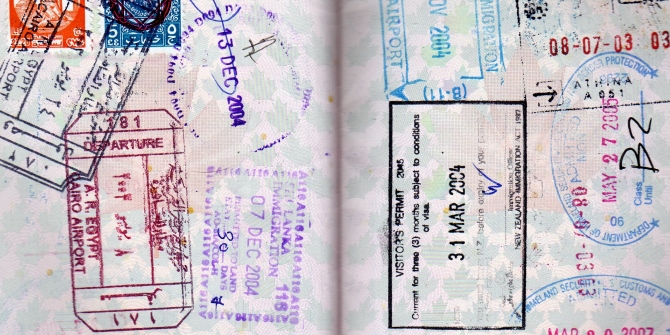by Ann Livingston

Civil registration is defined by the United Nations as “the continuous, permanent, compulsory and universal recording of the occurrence and characteristics of vital events pertaining to the population as provided through decree or regulation in accordance with the legal requirements of a country”. As civil registration establishes the existence of a person under the law, it has been the fundamental means of conferring legal identity to an individual.
Legal identity is defined as the basic characteristics of an individual’s identity — e.g. name, sex, place and date of birth and family ties — conferred through registration and the issuance of a certificate by an authorised civil registration authority following the occurrence of a vital event such as birth, death, marriage, divorce or adoption.
In the absence of civil registration, legal identity may be conferred by a legally-recognised identification authority, as in the case of refugees. While Member States are primarily responsible for conferring legal identity and issuing identity papers, conferring legal identity to refugees may also be administered by an internationally recognized and mandated authority (such as UNHCR). Furthermore, civil registration is recognised as the ultimate source for production of comprehensive, regular and reliable vital statistics. The main purpose of civil registration is to establish a relationship between individuals and a State, and ensure the rights that derive from this legal identity under the laws of the country.
The right to be recognised as a person before the law is in all nine major international human rights instruments, and is a non-derogable right, which means it can never be rescinded or suspended, even in an emergency. The goal of achieving universal legal identity, starting from birth is captured in the Sustainable Development Goal (SDG) Target 16.9: to provide “by 2030, a legal identity for all, including birth registration” and is measured by indicator 16.9.1: “proportion of children under age 5 whose births were registered by a civil authority”.
Yet, despite member states’ commitment to have universal civil registration and vital statistics (CRVS) systems, over 110 low and middle-income countries lack fully functioning systems. This absence prevents access to a broad range of human rights, including the right to be registered at birth, for identity to be preserved and to acquire a nationality. This is compounded by the lack of data available to measure or respond to these human rights violations.
To support member states in achieving the Sustainable Development Goals through meeting target 16.9 to ‘provide legal identity for all, including birth registration’, the United Nations created an inter-agency Legal Identity Expert Group (LIEG). The LIEG will ensure the necessary actions be taken by UN agencies in order to drive a coherent and effective response in supporting member states to achieve the goal of closing the global identity gap.
States also need to know how many people are born, when and where and how many die each year in order to have well-functioning governance systems and effective planning policies. With the core of humanitarian response aiming at addressing the basic needs of people, such as safety, health and education, provision of civil registration services continues to be a challenge in countries with emergency settings, leading to both short and long-term consequences, including statelessness. In most of Africa, mortality statistics systems do not exist or are weak and are often characterised by uncoordinated and fragmented collection of data from various sources. Children born abroad from refugee/migrant parents, whose parentage is neither established by a birth certificate nor a ruling are at equally high risk of statelessness.
What are the effects of emergencies on CRVS systems?
In almost all humanitarian situations, such as in armed conflicts, public health emergencies and natural disasters, vital event registration systems become poorly operational and sometimes entirely collapse. Population displacement creates major challenges, strains governments resources and often disrupts continuity of government systems and services. With a sudden or large influx or movement of populations, civil registration centers can be destroyed, which may mean permanent loss of birth and death records for thousands of individuals’ records as they are not backed up in a secure location. Civil registration services become even more hindered in providing quality services at the desired scale, especially to vulnerable population groups. In such situations, the administrative system fails to record and register vital events leading to a backlog of unregistered children and absence of reliable cause of death information.
How can CRVS systems be resilient to emergencies?
Different mechanisms, strategies and initiatives, including technological platforms can effectively help facilitate the provision of services including civil registration, vital statistics and identity management services in humanitarian situations.
The use of technology in emergency contexts can be greatly beneficial to facilitating access to registering vital events and retrieving identity documents when the necessary infrastructure, energy supply, capacity of staff and adequate privacy and security mechanisms are in place. The most notable impacts are related to overcoming distance barriers, durability and efficiency of the system. A well-functioning digital system shortens and expedites turnaround time for processing civil registration and re-issuance of lost or destroyed documents. Data can be collected in real-time and can be interoperable with other government systems such as health information systems.
But the appropriate use of technology is determined by the environment in which it is being utilised. The use of any technology cannot be dissociated from concerns over adequate infrastructure, energy supply, and sustainability as well as growing concerns over security, scalability and privacy. Moving towards a digital system is a huge monetary investment. Most low-income economies struggle with poor telecommunication networks, consistent interruption of power, insufficient infrastructure, lack of trained personnel at the local level to support or sustain the efficient use of technological systems for civil registration. In fragile contexts, infrastructure is often destroyed, including schools, hospitals and civil registration centres. In such countries, focus needs to be given on supporting the State with restoring basic necessities such as stabilising the conflict situation, providing life-saving services and building the minimum infrastructure, before technological solutions can prove to be the most beneficial or sustained.
Further, civil registration can be strengthened by implementing legal frameworks to regulate not only the process itself but also concerns around data protection and confidentiality. When this is in place, the use of technology for civil registration purposes can also be linked with other sectors such as health systems, whereby the innovative approaches applied as part of health programs have the potential to rapidly scale up the notification and registration of births and deaths and to improve the availability and quality of vital statistics that are essential for program planning and monitoring. These interactions between health services and CRVS can be summarised as health system and CRVS interoperability, whereby civil registration services are offered together with health and other government services.
Functioning and interoperable civil registration, vital statistics and identity management systems are essential for a government to generate better information, implement policies to protect its population and monitor or adjust strategies to care for its most vulnerable groups. Yet, in emergency situations, such as conflict, displacement or public health emergencies, establishing reliable and resilient civil registration and identity systems can prove to be challenging and call for specific coordination and collaboration with the State and partner organisations to improve the systems and services in place and prevent situations of statelessness.
 Ann Livingston is a consultant for the Child Protection Section of Programme Division at UNICEF HQ. Her research focuses on civil registration in humanitarian context. She holds a masters in Economic Law from Sciences Po Paris.
Ann Livingston is a consultant for the Child Protection Section of Programme Division at UNICEF HQ. Her research focuses on civil registration in humanitarian context. She holds a masters in Economic Law from Sciences Po Paris.
This blog post and the others in the series are based on presentations during a workshop convened by the MEC on 1 March 2019 discussing statelessness and legal identity in the context of migration. @BronwenManby
In this series:
- Preventing Statelessness among Migrants in North Africa and their Children: Birth registration and ‘legal identity’ by Bronwen Manby
- State Obligation to Establish Legal Identity in Comparative Perspective by Alenka Prvinšek Persoglio
- Civil Registration and Legal Identity in Humanitarian Settings by Ann Livingston
- Preventing Statelessness among Undocumented Migrants: The role of the International Organization for Migration by Anne Althaus & Laura Parker
- From Birth Registration to Confirmation of Citizenship: Is the UK process the model to aspire to? by Elan Schwarz and Brianna Gomez
- What is the Fuss over the UN’s Global Compact for Safe, Orderly and Regular Migration? by Elspeth Guild
- When Identity Documents and Registration Produce Exclusion: Lessons from Rohingya Experiences in Myanmar by Natalie Brinham
- Consular Protection, Legal Identity and Migrants’ Rights: Time for Convergence? by Stefanie Grant
- Obstacles to Accessing Civil Registration and Identification: NRC’s Field Experiences with Displaced Persons by Fernando de Medina-Rosales
- Defining Identity and Identifying Migrants in the Global Compact for Migration by Tendayi Bloom






